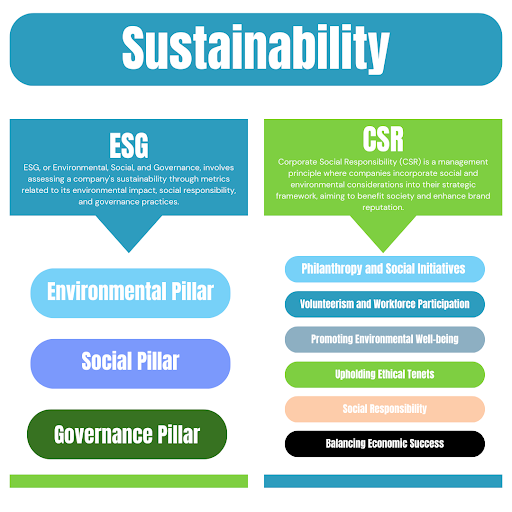
09 Dec Understanding Sustainability: What is the Difference Between ESG and CSR
In the modern realm of business ethics, the notions of Environmental, Social, and Governance (ESG) as well as Corporate Social Responsibility (CSR) have attracted substantial notice. These two interconnected yet separate concepts are crucial for comprehending how enterprises contribute to sustainable actions and the welfare of society. These dual frameworks are frequently employed to evaluate and advance sustainability within organisations. Despite the shared emphasis of both ESG and CSR on the societal and environmental influence of businesses, notable disparities exist between the two frameworks. This article seeks to offer an all-encompassing grasp of ESG and CSR, illuminating their differences and resemblances.
Understanding ESG: A Holistic Approach to Sustainability
ESG, or Environmental, Social, and Governance, involves assessing a company’s sustainability through metrics related to its environmental impact, social responsibility, and governance practices. This evaluation aims to determine the company’s sustainability and resilience, thereby holding it accountable for its sustainability commitments. In recent years, ESG has gained immense interest from investors and corporate stakeholders, being recognized as a dominant trend of the decade. ESG provides a quantifiable measurement of sustainability, which is increasingly sought after by investors and stakeholders alike. It measures a company’s sustainability level and offers a practical, thorough perspective on this matter. ESG signifies the measurable outcome of a company’s overall sustainability performance.
In contrast, Corporate Social Responsibility (CSR) is a management principle where companies incorporate social and environmental considerations into their strategic framework, aiming to benefit society and enhance brand reputation. CSR objectives may include minimising carbon footprint, refining labour practices, creating eco-friendly workspaces, or innovative endeavours such as repurposing plastic waste, exemplified by Adidas.
Originating in the 1970s, CSR gained prominence and became pivotal for businesses of all sizes by the early 2000s. It embodies a company’s voluntary initiatives addressing social and environmental challenges beyond legal obligations. CSR encompasses a broad spectrum of actions, from philanthropy to community engagement and sustainable business practices. This concept has evolved over decades, adapting to shifting societal expectations placed on corporations.
ESG: Environmental, Social, Governance
Presently, the ESG standing significantly influences the choices made by financiers regarding capital allocation and shapes the viewpoints of investors and stakeholders regarding financial well-being. Businesses that give genuine attention to ESG can access fresh markets, curtail expenses, amplify employee efficiency and retention, and enhance asset distribution. The ESG concept can be deconstructed into three core pillars, encapsulating the spectrum of considerations that companies must navigate in their pursuit of responsible business practices;
- Environmental Pillar: Central to the environmental facet of ESG is the company’s influence on the natural world. Companies attuned to ESG considerations evaluate their carbon emissions, energy effectiveness, waste handling, and commitment to responsible resource consumption. Through minimising environmental hazards and embracing ecologically responsible approaches, enterprises strive to play a role in advancing environmental sustainability. This pillar pertains to a company’s ecological influence, encompassing concerns such as CO2 discharges, overall carbon impact, water utilisation, contamination, and methods for waste control.
- Social Pillar: The social aspect of ESG focuses on a company’s relationships with its employees, customers, suppliers, and communities. It encompasses efforts to promote diversity and inclusion, ensure employee welfare, protect human rights, and engage with local communities. By fostering strong social bonds, companies aim to have a positive impact on various stakeholders. This dimension evaluates workplace diversity, employee safety, responsible supply chain practices, community involvement, and broader societal effects, highlighting the significance of ethical and responsible social interactions within and beyond the organisation.
- Governance Pillar: The governance aspect of ESG focuses on a company’s internal mechanisms that guide decision-making and behaviour. It encompasses transparent leadership, ethical conduct, board accountability, and shareholder rights, all of which contribute to building trust, reducing corruption, and fostering sustainable success. This pillar involves examining a company’s internal policies for risk management, ethics, board structure, shareholder rights, and more. Governance within ESG pertains to the systems, processes, and structures that shape a company’s operations, influencing its behaviour and impact on stakeholders. It covers aspects such as corporate governance, decision-making processes, ethics, stakeholder engagement, risk management, and transparent reporting, all of which are crucial for promoting responsible and sustainable business practices.
CSR: Corporate Social Responsibility (Beyond Profit, Towards Purpose)
Corporate Social Responsibility (CSR) is a business strategy where companies integrate ethical and sustainable practices into their operations and decisions, going beyond legal obligations to benefit society, the environment, and stakeholders. The framework helps companies be socially accountable to themselves, their stakeholders, and the public. This includes initiatives like philanthropy, community engagement, environmental care, fair labour practices, and actions to create positive social change. The aim of CSR is to enhance societal well-being and improve a company’s reputation and long-term sustainability.

- Philanthropy and Social Initiatives: Within the CSR framework, philanthropic actions and community-driven initiatives serve as tangible expressions of a company’s commitment to societal betterment. These encompass a wide array of activities, such as charitable donations, sponsorships of educational programs, funding for healthcare initiatives, and support for grassroots organisations.
Moreover, CSR-inspired companies actively engage in addressing immediate challenges by responding swiftly to disaster relief efforts, further showcasing their dedication to societal welfare. By investing resources and efforts into these initiatives, companies align their goals with the well-being of the communities they operate within.
- 2. Volunteerism and Workforce Participation: Employee engagement forms a central tenet of CSR, where companies facilitate avenues for their staff to contribute to causes that catalyse societal improvement. Through volunteering opportunities, employees can actively participate in activities such as mentoring youth, participating in clean-up campaigns, or providing skill-building workshops in underserved areas. By involving their workforce in meaningful initiatives, companies foster a sense of shared purpose, unity, and camaraderie. This engagement transcends the workplace and strengthens the bond between the company and its employees, ultimately creating a collective force for positive change.
- Promoting Environmental Well-being: While Environmental, Social, and Governance (ESG) principles delve into integrating sustainable practices into a company’s core operations, CSR complements this by spotlighting visible ecological initiatives. From planting trees in urban landscapes to launching campaigns that champion waste reduction and resource conservation, these initiatives demonstrate a company’s genuine commitment to environmental stewardship. Such efforts align with societal expectations for corporate accountability, contributing to broader environmental objectives beyond regulatory compliance.
- Upholding Ethical Tenets: Ethical practices form the cornerstone of CSR, reflecting a company’s dedication to conducting business in a manner that respects human rights, embraces fairness, and safeguards societal well-being. This extends throughout the supply chain, ensuring that suppliers adhere to similar ethical standards. Companies adopt comprehensive codes of conduct that prohibit child labour, forced labor, and unfair wage practices, while also prioritizing health and safety in workplaces. This commitment resonates with stakeholders, fostering trust and enhancing the company’s reputation as a responsible corporate citizen.
- Social Responsibility: This pillar refers to a company’s impact on society and its efforts to promote social well-being. By promoting diversity and inclusion in their workforce, companies acknowledge the value of varied perspectives and experiences, contributing to a more equitable society. Additionally, engaging with local communities through initiatives like infrastructure development, skill-building workshops, and healthcare outreach demonstrates a genuine commitment to fostering well-being on a grassroots level. CSR initiatives empower companies to be active contributors to societal progress and positive change.
- Balancing Economic Success: This pillar refers to a company’s responsibility to make a profit while also contributing to economic development. In simple terms, it is a company’s dual commitment to financial prosperity and community development. Beyond generating profits, companies play a pivotal role in economic growth by creating jobs, investing in local businesses, and contributing to the economic ecosystem. By adhering to fair labour practices, providing competitive wages, and fostering innovation, companies enhance their contribution to the broader economy while ensuring the well-being of their employees and the communities they serve.
Conclusion
In summary, ESG and CSR are not opposing concepts but complementary strategies. When ESG principles are seamlessly integrated into a company’s core operations, they synergize with purpose-driven CSR initiatives, fostering a holistic commitment to responsible business practices. As the global demand for sustainability intensifies, businesses stand at a pivotal juncture. ESG and CSR offer distinct paths, both contributing to a company’s dedication to ethical conduct and societal impact. By understanding their distinctions, businesses can forge a path where profitability harmonises with purpose, leaving a meaningful imprint on both society and the environment. In essence, ESG and CSR coalesce as powerful allies, driving authentic sustainability in an interconnected world.

No Comments